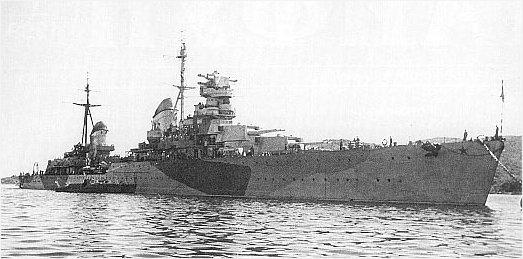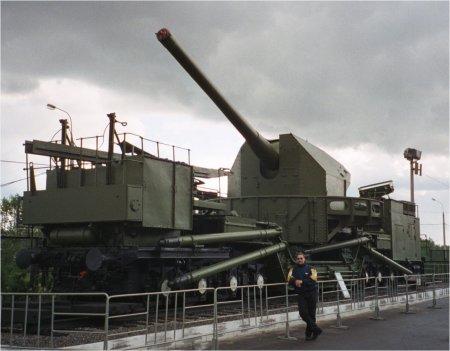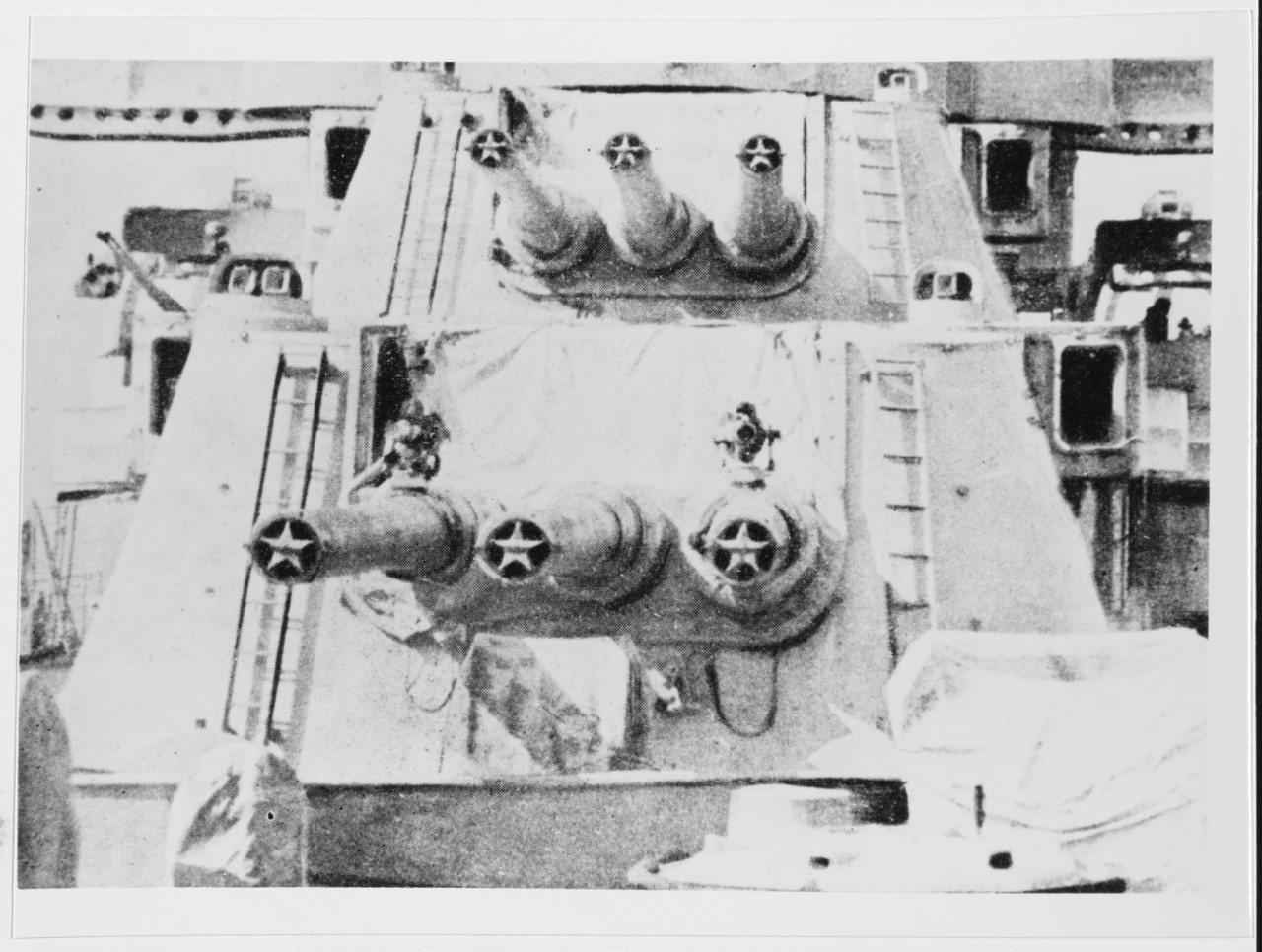When work on the incomplete cruiser Krasnyi Kavkaz was restarted in 1927, it had been planned to fit her with eight 8" (20.3 cm) guns in four twin turrets. However, it was quickly determined to be impossible to mount this much armament on the small and lightly constructed hull of this ship. Instead, four guns of the smaller caliber of 180 mm (7.1") were installed. These were 8"/50 (20.3 cm) Pattern 1905 guns relined down to 18 cm/60 (7.1"). These guns were to have had a very high muzzle velocity of 3,281 fps (1,000 mps) but initial trials showed that this would have given them a liner life of less than 10 rounds. The guns were derated but even then their life was quite short.
Early trials with these weapons showed numerous faults and so a new design was commissioned with a lower muzzle velocity and a shorter barrel length. This design was designated as the 180 mm/57 (7.1") B-1-P Pattern 1932. The early prototypes were of built-up construction, but in 1932 the technology of making loose liners for guns with bores from 3" to 8" (7.62 cm - 20.3 cm) was purchased from the Italian firm of Ansaldo. With this technology in hand, later versions of the 180 mm (7.1) guns were manufactured with loose liners. There were two differing liners used, one with deep grooves and one with shallow grooves. These liners were not interchangeable and required different ammunition.
Three coast defense mounts using these guns were in service. The first one was MO-8-180 using 8"/50 (20.3 cm) guns relined to 180 mm/56 (7.1") with ballistics identical to those of the B-1-P gun. A total of 9 mounts were built in 1933-35 and all were installed in the Far East. The second coastal mount was another open mounting designated as MO-1-180 and designed in 1934. A total of 42 mounts were built by June 1941 and these were installed in 12 batteries located all around the Soviet coastline. Those batteries that survived the war remained in active service use until the 1960s-70s.
The third coastal mount was the MB-2-180 twin turret designed in 1931-32. A total of eight turrets in 4 batteries were installed in the North in the 1930s-40s, six turrets in 3 batteries were installed along the Baltic coast by 1941, six turrets in 3 batteries were installed along the Pacific coast in the 1930s-40s and two turrets in 1 battery were installed along the Black Sea coast after the war. Surviving turrets were in use into 1990s.
Construction of the B-1-P was of loose liner, A tube, jacket and breech ring. Used a Vickers piston breech, which opened upwards.
| Designation | 180 mm/60 (7.1") B-1-K Pattern 1931
180 mm/57 (7.1") B-1-P Pattern 1932 180 mm/56 (7.1") Pattern 1933 |
|---|---|
| Ship Class Used On | B-1-K Pattern 1931: Krasny Kavkaz
B-1-P Pattern 1932 Kirov Class (Pr. 26) Maxim Gorky class (Pr. 26bis) Railroad guns TM-1-180 Coastal defense twin turrets MB-2-180 Coastal defense open mounts MO-8-180 Coastal defense open mounts MO-1-180 |
| Date Of Design | 1929 |
| Date In Service | 1931 - 1932 |
| Gun Weight | Pattern 1931: 18.2 tons (18.5 mt)
Pattern 1932 With shallow liner: 17 tons (17.23 mt) With deep liner: 17.1 tons (17.33 mt) |
| Gun Length oa | Pattern 1931: 419.6 in (10.660 m)
Pattern 1932 With shallow liner: 403.9 in (10.260 m) With deep liner: 407.2 in (10.345 m) |
| Bore Length | 398 in (10.110 m) |
| Rifling Length | Pattern 1931: 314.9 in (8.000 m)
Pattern 1932 With shallow liner: 322.4 in (8.190 m) With deep liner: 325.4 in (8.267 m) |
| Grooves | Pattern 1931: 48
Pattern 1932 With shallow liner: 48 With deep liner: 40 |
| Lands | N/A |
| Twist | N/A |
| Chamber Volume | Pattern 1931: 3,814 in3 (62.5 dm3)
Pattern 1932 With shallow liner: 3,777 in3 (61.9 dm3) With deep liner: 3,192 in3 (52.3 dm3) |
| Rate Of Fire | MK-1-180 single mount
Designed: 6 round per minute Practical: 4 round per minute MK-3-180 triple mount
MO-8-180 single open mount
MO-1-180 single open mount
MB-2-180 twin turret
|
| Type | Bag |
|---|---|
| Projectile Types and Weights | All rounds 215 lbs. (97.5 kg) |
| Bursting Charge | 180 mm/60, 180 mm/57 with shallow grooved liner 1 AP mod 1928 (#257): 4.4 lbs (2 kg) AP mod 1928 (#140-A): 4.3 lbs (1.95 kg) HE mod 1928 (#938): 16.1 lbs. (7.3 lbs.) HE mod 1928 (#121-A): 15.4 lbs. (7.0 kg) 180 mm/57 with deep grooved liner 1 |
| Projectile Length | 180 mm/60, 180 mm/57 with shallow grooved liner
AP mod 1928 (#257): 33.97 in (863 mm) AP mod 1928 (#140-A): 36 in (914 mm) HE mod 1928 (#938): 38.1 in (967 mm) HE mod 1928 (#121-A): 38 in (966 mm) 180 mm/57 with deep grooved liner
|
| Propellant Charge 2 | 180 mm/60, 180 mm/57 with shallow grooved liner: 88.1 lbs. (40 kg)
180 mm/57 with deep grooved liner: 82.67 lbs. (37.5 kg) |
| Muzzle Velocity | 180 mm/60, 180 mm/57 with shallow grooved liner
Designed: 3,280 fps (1,000 mps) Achieved: 3,018 fps (920 mps) 180 mm/57 with deep grooved liner
|
| Working Pressure | Designed: 25.8 tons/in2 (4,000 kg/cm2)
Derated: 20.6 tons/in2 (3,200 kg/cm2) |
| Approximate Barrel Life | Shallow grooved liner: 55-70 rounds
Deep grooved liner: 320 rounds 180 mm/56: about 70 rounds |
| Ammunition stowage per gun | Krasny Kavkaz: 224 rounds
Pr. 26 and Pr. 26bis: 100 rounds MB-2-180: 204 rounds |
- ^Propellant was in halves.
| Elevation | Distance |
|---|---|
| 49 degrees | 40,600 yards (37,130 m) |
| Elevation | Distance |
|---|---|
| 45 degrees | 41,340 yards (37,800 m) |
| 50 degrees | 41,000 yards (37,494 m) |
| Elevation | Distance |
|---|---|
| 50 degrees | 42,200 yards (38,592 m) |
These range figures come from two different sources and may reflect differing muzzle velocities.
| Designation | Krasny Kavkaz
Single Turret (4): MK-1-180 Kirov and Maxim Gorky
Coast Defense
|
|---|---|
| Weight | MK-1-180: 192 tons (195 mt)
MK-3-180: 232-243 tons (236 -247 mt) MB-2-180: 369 tons (375 mt) MO-1-180: 82.2 tons (83.5 mt) MO-8-180: 57 tons (58 mt) |
| Elevation | Krasny Kavkaz: About -5 / +60 degrees
Kirov class: -4 / +48 degrees Voroshilov: -5 / +50 degrees MB-2-180: 0 / +50 degrees MO-1-180: -1 / +50 degrees MO-8-180
|
| Rate of Elevation | Krasny Kavkaz: 8 degrees per second
Kirov class: 10 degrees per second MB-2-180: 10 degrees per second MO-1-180: 10 degrees per second MO-8-180: 10 degrees per second |
| Train | MB-2-180: 360 degrees
MO-1-180: 360 degrees MO-8-180: 360 degrees |
| Rate of Train | Krasny Kavkaz: 8 degrees per second
Kirov class: 8 degrees per second MB-2-180: 3 degrees per second MO-1-180: 2.5 degrees per second MO-8-180: 6 degrees per second |
| Gun Recoil | Krasny Kavkaz: 35.4 in (90 cm)
Kirov class: 23.6 in (60 cm) MB-2-180: 33.5 in (85 cm) MO-1-180: 33.5 in (85 cm) MO-8-180: 43.3 in (110 cm) |
| Loading Angle | Krasny Kavkaz: -5 / +60 degrees
Kirov class: +6.3 degrees MB-2-180: +15 degrees MO-1-180: +12 degrees MO-8-180: +15 degrees |
- ^The triple turret guns were in a common cradle. Both the mounting and the breech were electrically powered. These mountings were considered cramped and difficult to work, resulting in a low rate of fire. The triple mounting used a powered rammer.



"Naval Weapons of World War Two" by John Campbell
"Sovetskie Boevye Korabli 1941-45: IV Vooruzhnie" (Soviet Warships 1941-45: Volume IV Armament) by A.V. Platonov
"Entsiklopedia Otechestvennoi Artillerii" (Encyclopedia of Fatherland (Russian) Artillery) by A.V. Shirokorad
"Cruisers of World War Two" by M.J. Whitley
---
Special help from Vladimir Yakubov
07 October 2006 - Benchmark
06 May 2022 - Updated to HTML 5 format and added photograph of Kirov class cruiser

